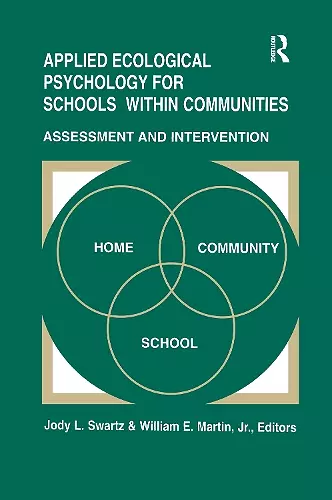Applied Ecological Psychology for Schools Within Communities
Assessment and Intervention
Jody L Swartz-Kulstad editor William E Martin editor Jody L Swartz editor
Format:Paperback
Publisher:Taylor & Francis Ltd
Published:8th Jul '16
Currently unavailable, and unfortunately no date known when it will be back
This paperback is available in another edition too:
- Hardback£135.00(9780805819908)

This volume provides a thorough examination of the interplay between individuals and their environment in the development and maintenance of problem behaviors, and delineates procedures for conducting assessment, intervention, and prevention within the child's ecosystem. As individuals structure, change, and organize their environments, their environments work to do the same. Environmental or contextual and individual variables act reciprocally to shape an individual's behavior. For school-aged youth, this reality necessitates an ecological approach to assessment, intervention, and prevention. Specifically, problem behaviors are partly developed and maintained by a combination of factors present in the child's psychosocial ecosystem -- home, school, and community. Although there is an abundance of theoretical applications and research supporting this concept, the predominant trend has been to emphasize the properties of the person. As a result, one is left to assume that the genesis of difficulties in adaptation lies in internal or personal states and traits of the individual.
In contrast to traditional psychology theories which focus primarily on the individual, incorporation of ecological psychology concepts allows for a more comprehensive and in-depth analysis of sources contributing to the individual's ability to adapt to their psychosocial environment. Ecological theories which drive assessment, intervention, and prevention efforts provide the necessary framework for assisting school-aged youth and their associated ecological networks to cope with and overcome the multidetermined, multifaceted concerns that arise during the school years. However, this is an often difficult and cumbersome task for educators, parents, and school systems to undertake.
To this end, this volume focuses on the functional application of ecological psychology for schools within communities. Each of the 10 chapters -- written by key figures in school, family, counseling, and community psychology -- explores the use of ecological theory from a different perspective, ranging from focus on the child, the child within the classroom, the classroom teacher, and the community to considerations in working with special populations such as juvenile delinquents and in planning for developmental issues such as school-to-work-transition. The final chapter summarizes and integrates the previous chapters and provides suggestions for future directions in the field.
ISBN: 9781138963696
Dimensions: unknown
Weight: 453g
254 pages